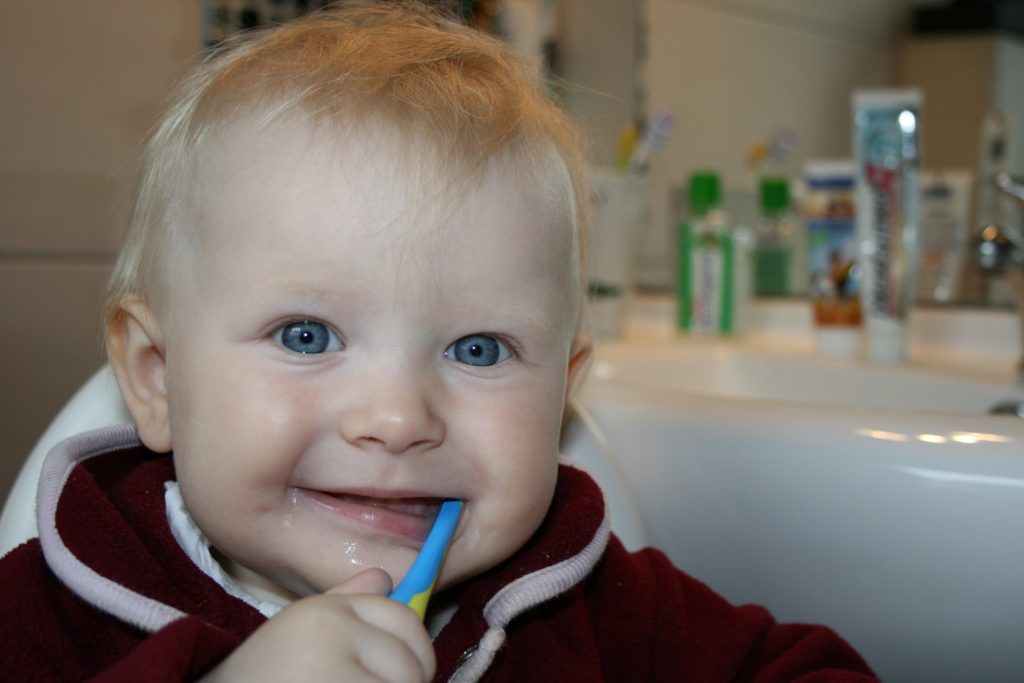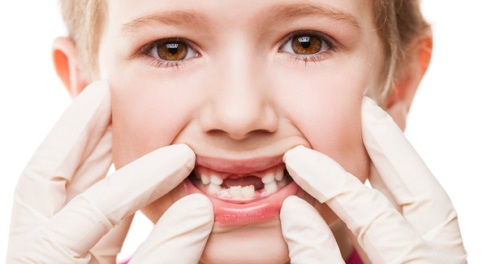 When should my child have their first dental visit? Many parents ask this question. Unfortunately some don’t even realize it is an important question to ask. They believe baby teeth are not so important because they are going to be replaced by permanent teeth any way. This couldn’t be further from the truth. Baby teeth play a vital role in your child’s early years but also in their later years as well. Even though they are called “baby teeth” they will have their primary teeth for many years. The front 4 primary teeth generally last until 6-7 years of age and the back teeth (cuspids and molars) aren’t replaced until age 10-13.
When should my child have their first dental visit? Many parents ask this question. Unfortunately some don’t even realize it is an important question to ask. They believe baby teeth are not so important because they are going to be replaced by permanent teeth any way. This couldn’t be further from the truth. Baby teeth play a vital role in your child’s early years but also in their later years as well. Even though they are called “baby teeth” they will have their primary teeth for many years. The front 4 primary teeth generally last until 6-7 years of age and the back teeth (cuspids and molars) aren’t replaced until age 10-13.
Vital roles of your baby’s primary teeth:
- Baby teeth help your baby chew. A cavity free mouth will help your child chew his food properly which will help him/her with their digestion.
- They help them learn to speak and smile. Teeth are important in learning to talk. Missing teeth in their early years can affect the proper development of their speech.
- They hold space in the jaw for the permanent teeth to grow under the baby teeth.
 This is a very important function of baby teeth. While the adult teeth are forming underneath the baby’s gums, the baby teeth keep space available so that the adult teeth can grow in normally into the mouth. When a baby tooth is lost too early, the permanent teeth can drift into the empty space and make it difficult for other adult teeth to find room when they come in. This can make teeth crooked or crowded.
This is a very important function of baby teeth. While the adult teeth are forming underneath the baby’s gums, the baby teeth keep space available so that the adult teeth can grow in normally into the mouth. When a baby tooth is lost too early, the permanent teeth can drift into the empty space and make it difficult for other adult teeth to find room when they come in. This can make teeth crooked or crowded. - They assist the normal development of the jaw muscles. Just like other muscles in the body, a baby’s jaw muscles need exercise to help them develop. Their primary teeth help with proper chewing and this helps to build these muscles. Without well-developed jaw muscles a baby’s jaw muscles may not develop properly.
When should I start brushing my baby’s teeth?
As soon as the first tooth appears you should start brushing your baby’s teeth. From the time the first tooth appears until the child is 3 years old you only need to use a very small amount of toothpaste (about the size of a grain of rice). Brush twice per day or as directed by your dentist. You want to start off your baby with a soft toothbrush made for babies at least up until your child is two years old. You can also consult with your dentist when you should change the type of toothbrush you are using.
If your child is from 3 to 6 years of age use a bit more toothpaste (about the size of a pea) and ensure you brush the teeth thoroughly twice a day. You want to supervise their brushing so you can make sure they are brushing thoroughly but also to make sure they do not swallow the toothpaste.
When your child has two teeth that touch you should begin flossing their teeth daily. I recommend doing this between the ages of 2 to 6. You can then start teaching them to do it on their own but you should still supervise them to make sure they do it thoroughly.
When should I take my baby to a dentist?
You should take your baby in to see a dentist after the first tooth comes in and no later than the first birthday. A dental visit at an early age is a “well-baby checkup” for the teeth. The dentist can check for cavities and any other problems. Also the dentist can show you how to clean your child’s teeth properly.
Early care for a child means a great deal to their health. Also, if they are exposed to a dentist at an early age we can make sure their first experiences are pleasant ones so they don’t build up fears about going and seeing the dentist.
If you have a young child with primary teeth call us now and make an appointment and we will get your child off to a great, healthy start in life by ensuring they have healthy teeth.
Dr. Ruth Kenworthy, DDS

